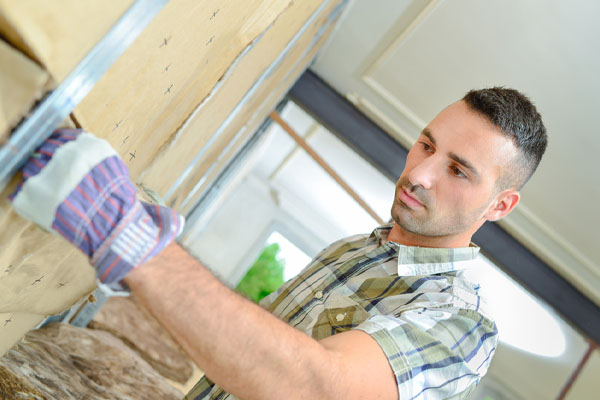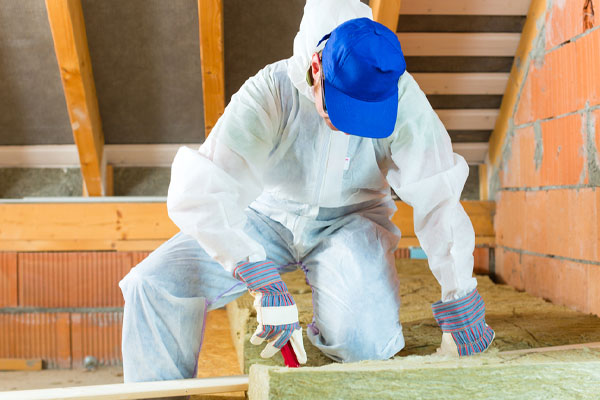How Much Insulation Do I Need?
Updated: 11/04/2024

Insulating your home adequately enhances heat flow resistance and lowers your cooling and heating expenses. Proper insulation also makes your home more comfortable, creating a stable indoor environment year-round. Many homeowners ask us, “How much insulation do I need?” This is a crucial question, as the right amount of insulation can significantly impact energy efficiency and overall comfort. Factors such as your home’s size, climate, and existing insulation levels all play a role in determining your specific needs.
In this article from Ascend Construction, we’ll explore the various types of insulation, recommend R-values for different areas of your home, and provide tips for maximizing your insulation investment. Keep reading to know more information on this topic.
Important Aspects When Considering Insulation
Contents
- Important Aspects When Considering Insulation
- Tips On Insulating Your Property Properly
- Insulation Frequently Asked Questions
- What Are The Key Factors To Consider When Determining Insulation Needs?
- How Does Insulation Improve Comfort And Energy Efficiency In A Home?
- What Are The Potential Risks Of Attempting A DIY Insulation Project?
- Why Is It Important To Choose Insulation With The Appropriate R-Value?
- How Can Existing Insulation Affect The Amount Of New Insulation Required?
- Conclusion
- Contact Ascend Construction for Reliable Insulation Services in Fort Collins, Colorado

When hiring a contractor for an insulation project, the level of insulation they recommend should be based on several key factors:
- Areas to Insulate: Different parts of your home—such as attics, walls, and floors—require varying insulation levels. For example, attics typically need more insulation than walls due to heat rising. Identifying the specific areas that require insulation will help determine the appropriate amount needed.
- Type of Insulation: The choice of insulation material plays a significant role in its effectiveness. Options range from fiberglass and foam to spray insulation and cellulose, each with different R-values and installation methods. A knowledgeable contractor can help you choose the best type for your home’s needs.
- Location: Your geographic location greatly influences the recommended R-values for insulation. Areas with extreme temperatures, whether hot or cold, may require higher insulation levels to maintain energy efficiency. Understanding local climate conditions is crucial in making informed decisions.
Some homeowners consider adding insulation a DIY project, but this can be misleading. There are many risks involved, including exposure to hazardous materials, inadequate tools, and the potential for selecting the wrong insulation type. Additionally, DIY insulation projects often cost more than hiring a professional contractor due to potential mistakes and the need for rework.
Before embarking on any insulation project, it’s essential to inspect your property to assess the current condition of your insulation. More importantly, consulting with a professional insulation contractor is crucial. Reputable companies, such as Ascend Construction, possess the expertise to evaluate your home’s unique needs and recommend the most effective insulation solutions for various conditions. Their knowledge can save you time and money and ensure a safer, more efficient installation.
Superior Insulation Services From Ascend Construction: Enhance your home’s energy efficiency with our expert insulation solutions. Call now!
Tips On Insulating Your Property Properly
Call A Contractor To Determine The Areas In Your Home That Need Insulation

How much insulation you’ll need will depend in part on the area you intend to install it. The common areas in a home that need to be insulated include floors, walls, and attics. The attic, in particular, should be sufficiently insulated to prevent the updraft from drawing in cooler air.
Therefore, you’ll likely need more insulation in your attic than you would for your floor. If your goal is to add wall insulation on top of existing batting or add blown-in insulation material to the walls of an older house, you’ll normally need more insulation compared to what you’ll need under your flooring but less than what you’ll need for attic insulation.
In case cold air is filtering through slits in your floorboards, you should add insulation to your floor to ensure moisture doesn’t get in and encourage mold growth or warp the wood. A contractor can fill the tiny gaps using spray foam, or they can fasten or glue foam sheets to floor joists underneath your floor. Once again, you should get a professional to do the insulation.
Trust Ascend Construction For Insulation Excellence: Upgrade your insulation for better comfort and savings. Call us now!
Choose Insulation Material With The Right R-Value
Insulation material’s capability to resist conductive heat flow is rated or measured in terms of R-value or thermal resistance. The higher the material’s R-value, the greater the insulation effectiveness. The material’s density and thickness determine the R-value of insulating material.
Some of the external factors that determine the R-value include moisture accumulation, aging, and temperature. To find the R-value of multilayered insulation, simply add up the individual R-values of the constituent layers.
While homeowners need to understand what insulation is about and what R-value means, you’ll be better off consulting a certified insulation contractor, preferably one that understands the R-value requirements in your area. This is because R-values tend to vary from region to region. For instance, when it comes to attic insulation, the ideal R-values for Southern and Northern states are R-30 and R-38, respectively. Therefore, be sure to work with a professional for your insulation project. They will make the best R-value recommendations for your region and home.
Keep Your Home Comfortable With Quality Insulation: Trust Ascend Construction for reliable and effective insulation installations. Contact us today!
The Size Of Your Walls
The amount of material your contractor will need to insulate a space depends on the size of the area. For example, if it’s a wall, they will calculate the size by multiplying its width and height.
If there are windows and doors, they will calculate their surface area and then subtract it from the area of the wall. This is because they won’t be insulated. If you don’t have batt insulation on your wall, they recommend filling nooks with loose-fill insulation to enhance your home’s ventilation.
If you have an older house, you’ll likely need more insulation compared to if it’s a new build. This is because, over time, insulation settles in walls. In such situations, your contractor can optimize your home’s comfort by filling holes in the walls with blown-in insulation.
The Size Of The Floor

To determine the amount of insulation you need for your flooring, the contractor will first calculate the floor area that needs to be insulated by multiplying width and length. This will inform them of the insulation they need to prevent moisture and cold air from seeping into holes and cracks. Air leakage can lead to mold growth and ventilation issues.
The amount of insulation you’ll need for your floor will likely not be what you’ll need for your attics and interior walls. If you reside in the Southern region, your insulation expert will likely recommend R-13 for your floor insulation. Conversely, if you live in the Northern part of the country, they’ll likely recommend R-30. Remember that by working with a professional, they’ll understand the necessary calculations to determine the ideal R-value for your area and home.
Boost Energy Savings With Expert Insulation: Ascend Construction provides top-notch insulation services to reduce your energy bills. Call today!
The Existing Insulation
The level of insulation your home requires also hinges on the existing insulation as well as the kind of insulation material you choose. If your property already has some level of insulation, the amount of insulation you’ll need will be lower compared to someone starting from scratch. Besides, even if your insulation meets the Department of Energy’s guidelines, you may still need to beef it up if your home is cold during winter and hot during summer. Depending on where you need to install extra insulation, you may need spray or blown-in insulation in some areas.
Insulation Frequently Asked Questions

What Are The Key Factors To Consider When Determining Insulation Needs?
When determining insulation needs, you should consider the specific areas of your home that require insulation, such as walls, floors, and attics. The type of insulation material you choose is crucial, as different materials have varying R-values, which measure their resistance to heat flow. Additionally, your geographic location plays a role in determining the appropriate R-value for your insulation, as climate conditions can vary. Existing insulation also affects how much additional insulation is necessary; if your home already has some insulation, you may need less than someone starting from scratch.
How Does Insulation Improve Comfort And Energy Efficiency In A Home?
Proper insulation significantly enhances your home’s comfort by maintaining consistent indoor temperatures, reducing the need for excessive heating in the winter and cooling in the summer. This is achieved by increasing the resistance to heat flow, which keeps warm air inside during colder months and prevents cool air from escaping during warmer months. As a result, your heating and cooling systems don’t have to work as hard, leading to lower energy bills and a more energy-efficient home overall.
What Are The Potential Risks Of Attempting A DIY Insulation Project?
Attempting a DIY insulation project can be risky due to several factors. Working with insulation materials often requires specialized tools and safety equipment to handle potentially hazardous substances like fiberglass. With proper knowledge, you might choose the right type of insulation or install it correctly, leading to poor performance and increased energy costs. Moreover, DIY mistakes can end up costing more in the long run, as you may need to hire a professional to fix any errors or redo the insulation entirely.
Affordable And Efficient Insulation Services: Improve your home’s insulation with Ascend Construction’s cost-effective solutions. Contact us today!
Why Is It Important To Choose Insulation With The Appropriate R-Value?
Choosing insulation with the appropriate R-value is essential because it determines how effective it will resist heat flow. The R-value is influenced by the material’s density, thickness, and specific environmental factors like temperature and moisture. Insulation with a higher R-value provides better thermal resistance, which is crucial in regions with extreme temperatures. A professional contractor can help you determine the correct R-value for your area, ensuring that your home remains comfortable and energy-efficient throughout the year.
How Can Existing Insulation Affect The Amount Of New Insulation Required?
The amount of new insulation you’ll need depends on the condition and type of your existing insulation. If your home already has some level of insulation that meets current standards, you may only need to add a minimal amount to boost performance. However, if your home is older or the existing insulation has settled or deteriorated over time, you may need to add more insulation to achieve optimal energy efficiency. A professional assessment can help determine whether you need to completely replace the old insulation or simply supplement it with new materials.
Conclusion
In summary, determining how much insulation your home needs is not a one-size-fits-all process; it requires careful consideration of various factors, including existing insulation, R-value requirements, and your home’s specific characteristics. While some homeowners might be tempted to tackle insulation projects themselves, consulting with a professional is the best way to ensure optimal results and energy efficiency.
Experts like those at Ascend Construction can provide tailored recommendations based on local conditions and building codes, helping you find the right answer to “How much insulation do I need.” Don’t hesitate to reach out for a thorough assessment and personalized guidance on your insulation needs.
Maximize Comfort And Efficiency With Ascend Construction: Our professional insulation services create a more energy-efficient home. Call today!
Contact Ascend Construction for Reliable Insulation Services in Fort Collins, Colorado
When selecting a provider for air sealing and insulation upgrades, it’s important to choose one that offers a combination of professional expertise and competitive pricing, as quality and cost can vary significantly in the market. Ascend Construction stands out as a top choice, offering a wide range of services, including insulation removal and installation, air sealing, energy conservation measures, energy audits, and whole-house fan installations.
Choose Ascend Construction for exceptional service that not only meets but exceeds your expectations, setting a new standard for excellence in the industry. You can trust us to handle all your insulation needs with the utmost professionalism and quality. Contact us today to experience the difference!

Reach out to Ascend Construction for a complimentary consultation. Our team is ready to offer effective solutions for your home in Fort Collins, focusing on those critical areas needing attention. Our services are competitively priced, and we stand behind the quality of our work with a guarantee. For direct communication, click here or use the button below to call Ascend Construction. We provide free, no-obligation, in-home consultations to evaluate your needs thoroughly.
Ascend Construction
301 S Howes St #1241
Fort Collins, CO, 80521
Related Articles:
- Insulating Multi-Story Fort Collins Homes: Tackling Each Floor with Precision
- The Subtle Art of Insulating Row Houses and Townhomes
- Autumn Audit: Why Fall Is The Perfect Time For An Insulation Upgrade
- The Benefits Of Professional Insulation Assessment Before You Buy A Home
- Mastering Thermal Dynamics: Enhancing Home Insulation Through Understanding Heat Flow